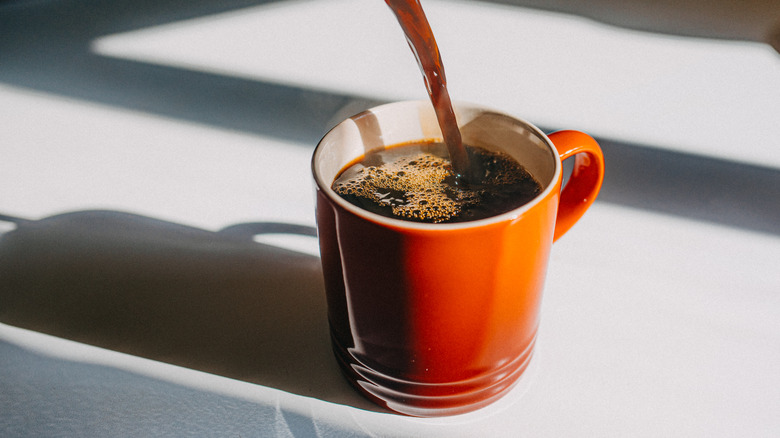Does Coffee Actually Dehydrate You? An Expert Explains
While coffee and espresso give us a fresh burst of morning energy, these drinks also come with downsides too. From anxiety to caffeine dependency, does coffee also dehydrate you? To get an expert perspective, Chowhound sat down for an exclusive chat with food scientist Kantha Shelke. Shelke is well-versed in food science as the principal at Corvus Blue LLC (a food research firm), a food science communicator at the Institute of Food Technologists, and a Senior Lecturer of Food Safety Regulations at Johns Hopkins University. According to Shelke, to understand the effects of coffee, we first have to learn about the caffeine inside. "Coffee contains caffeine, which acts as a mild diuretic and increases urine production," Shelke said. So, if you don't replace the liquids you've lost to caffeine, it can lead to dehydration. Still, there are ways to boost the flavor of coffee, so is there a way to stop caffeine's negative effects beyond drinking water? According to Shelke, the liquid in coffee often stops diuretic outcomes, so drinking one cup likely won't cause issues.
But how about two or three? "Consuming several cups of strong (and high-caffeine) coffee in a short period may cause noticeable dehydration, because the process of rehydration is not as fast as the diuretic effect of the caffeine," Shelke said. In other words, sip coffee slowly or you might miss out on its positive effects. Because if it's consumed too fast, coffee passes straight through the digestive system before the body absorbs any caffeine at all.
Other factors that play into coffee's effects
While the amount of coffee you have and how quickly you drink are two factors in determining if the beverage will dehydrate you, scientist Kantha Shelke says what else is in your body at the time of consumption is also important. "Coffee on an empty stomach may act faster," she said. To slow down coffee's effect, avoid drinking coffee on an empty stomach, and stay hydrated by drinking other beverages.
Finally, the last point that comes into play here, and perhaps the most important, is individual tolerance. "If one is unaccustomed to caffeine, consuming a high amount at once may increase urine output," Shelke said. While it typically takes the body 45 minutes to fully absorb coffee, its effects can happen anytime between 15 to 20 minutes of drinking it, depending on the person. And even if you are a habitual coffee drinker, the effects of this drink still depend on your metabolism, according to Shelke. So, you could feel longer-lasting effects, such as dehydration, anywhere between one to nine hours of drinking.
So, simply put, coffee's effects vary from person to person. Once you know how coffee affects you, you can determine how to best consume a morning cup without feeling negative effects. "Habitual drinkers often pace their consumption and dehydration is not one of the outcomes for them," Shelke said. If you enjoy coffee slowly and in moderation, you might miss out on the curse of dehydration.

